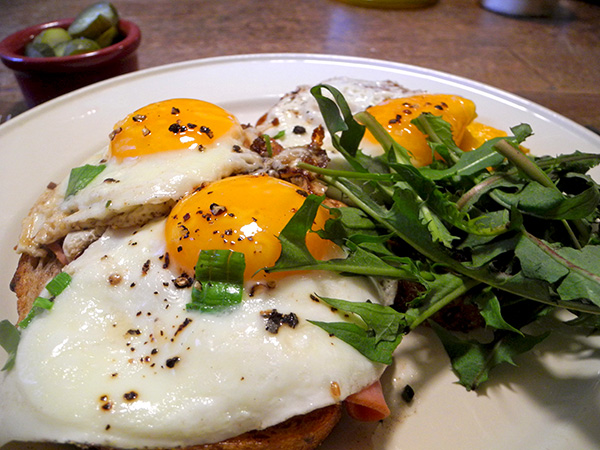
Yesterday I had come across a particularly fetching photograph of a Strammer Max (if you’re fond of eggs, there are actually many fetching photographs), so today I decided to essay this German breakfast classic for the first time, substituting its ham and eggs approach for our usual Sunday bacon and eggs (which always boasts a number of extras, both rotating and new). Both versions include toast, but the German tradition is much more straightforward (or ‘plain’? I promised myself not to say more bland) than my own embellishment of the classic American formula, meaning it eschews almost all of the varying herbs, spices, and seasonings that I usually add to the basic bacon and eggs thing, to keep it exciting week after week.
I still couldn’t just leave it alone, so today I added some chopped Frühlings-Knoblauch (Eng. spring garlic), and wilder Löwenzahn (Eng. wild dandelion), neither unknown in German lands, but perhaps not normally a part of Strammer Max, in addition to the very German Petersilien (Eng. parsley).
Even though I expect to be manipulating this simple Rezept beyond recognition on future Sundays, when it’s likely to evolve into something neither German nor American, but certainly at least a little ‘brown’, I’m going to remember the original inspiration.
Note: this Sunday mid-day meal is almost always both breakfast and lunch for us, and it’s followed only by dinner.
- four thick slices of Twelve Grain & Seed bread from Bread Alone, fried on both sides in several tablespoons of butter inside a large (13 1/4″) seasoned, cast iron pan and removed to a warm oven, a little more butter added to the pan and 6 Americauna chicken eggs from Millport Dairy Farm cracked into it and fried until their whites had almost not set, while at the same time 6 thin slices of smoked Whole Foods Market ham, that had first been brought to room temperature, were placed on top of the browned bread (2 ham slices on 2 of the bread slices, and one laid across half of each of the 2 other pieces), some torn wild cress arranged on top of the other halves of those pieces, the cooked eggs arranged on top of the ham, 2 eggs on each of 2 of the pieces, one on each of the other 2
- there were small cups of horseradish pickles from Millport Dairy Farm at the sides of the plates, a touch that was definitely more German than American – or even Wagnerian.
- the music was Francesco Feo’s 1734 (ca.) oratorio, ‘San Francesco di Sales’, Fabio Biondi conducting the Stuttgarter Kammerorchester